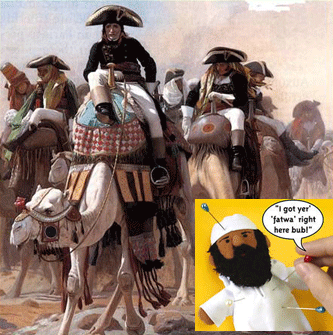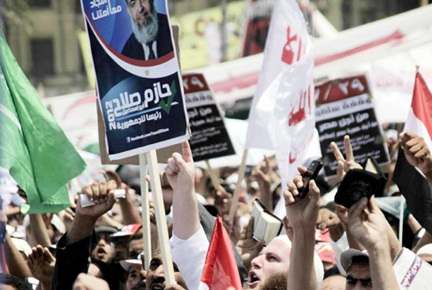
There are quite a few classic Arabic movies available in full on Youtube, if you search by the Arabic name. An example is the early Youssef Chahine film Bâb al-Hadîd (Cairo Station in English) in the original Arabic without subtitles.

There are quite a few classic Arabic movies available in full on Youtube, if you search by the Arabic name. An example is the early Youssef Chahine film Bâb al-Hadîd (Cairo Station in English) in the original Arabic without subtitles.

The Guardian has an interactive and updated timeline on the events labeled the “Arab Spring,” with links to articles in The Guardian. You can choose the time period and the country and the type of event or issue. It is current through September 26, 2011.

Consider the opening line of the lead story in yesterday’s New York Times:
BAGHDAD — Saudi Arabia and Libya, both considered allies by the United States in its fight against terrorism, were the source of about 60 percent of the foreign fighters who came to Iraq in the past year to serve as suicide bombers or to facilitate other attacks, according to senior American military officials.
In the long durée, as Napoleon might say if he were alive today, politics makes strange embedded fellows of nation states. There are three nations at play here in the field of lording over by the world’s reigning super power. Iraq and Libya had European imposed (and later revolution-deposed) monarchs at mid-stream in the 20th century. At the same time Saudi Arabia’s royal line evolved an iconclastic religiously mandated kingship that has withstood toppling and seems likely to do so far into the security based future. All three states are where they are today largely because of the world’s thirst for crude oil. The same three states, should Iraq survive de facto federation, face a future defined by a mega-politicized war on terrorism, a war with no state-like enemies being fought by a coalition of nation states willing to arm themselves to the teeth with conventional weapons and make airline passengers take their shoes off each and every time they fly. Two centuries from now a future Napoleon, whatever his or her nationality, may look back on the current political climate and have a hindsight sense of déjà vu, or will it be more of the voodoo politics mass mediated today? Continue reading Tabsir Redux: Déjà Voodoo

Now that we are about to officially head into the Autumnal paradox of the Arab Spring, there is no limit to the excess of punditry about why it happened, is happening and will continue to happen. Back in February, the historian Bernard Lewis weighed in on the current uprisings for an interview in The Jerusalem Post (which, for those with any historical memory, is not your parent’s Jerusalem Post). The article begins with Lewis’s summation in a nutshell: “The sort of authoritarian, even dictatorial regimes, that rule most of the countries in the modern Islamic Middle East, are a modern creation,†he notes. “The pre-modern regimes were much more open, much more tolerant.†Ah, yes, that Golden Age of Islam when the caliphs of the Arabian Nights were the community organizers of their eras. Surely Al-Hakim bi-Amr Allah did not really mean to destroy the church of the Holy Sepulcher in Jerusalem a millennium ago. That “more open, much more tolerant” pre-modern political paradise is as absurd as the more common Islamophobic trope that Muslims have always ruled by the sword. Indeed, as Lewis notes, the modern dictators in the region are a modern creation, but (as Lewis does not mention) largely the result of Western carving up and interference after World War I.
But the part of the interview that is most telling is the Freudian framing of the Arab twitter generation. I note here the question from the interviewer and the response by Lewis:
As we look at this region in ferment, how would you characterize what is unfolding now? Can we generalize about the uprisings that are erupting in the various countries? Is there a common theme?
There’s a common theme of anger and resentment. And the anger and resentment are universal and well-grounded. They come from a number of things. First of all, there’s the obvious one – the greater awareness that they have, thanks to modern media and modern communications, of the difference between their situation and the situation in other parts of the world. I mean, being abjectly poor is bad enough. But when everybody else around you is pretty far from abjectly poor, then it becomes pretty intolerable.
Another thing is the sexual aspect of it. One has to remember that in the Muslim world, casual sex, Western-style, doesn’t exist. If a young man wants sex, there are only two possibilities – marriage and the brothel. You have these vast numbers of young men growing up without the money, either for the brothel or the brideprice, with raging sexual desire. On the one hand, it can lead to the suicide bomber, who is attracted by the virgins of paradise – the only ones available to him. On the other hand, sheer frustration.
The fact that a young man (or woman) in Tunisia, Egypt, Libya or Yemen cannot get a job and make a living at home is not the tipping point for Lewis; no, it is pure jealousy — give me hamburgers and blue jeans or give me death — don’t tread on my cell phone. Then there is that particular “another thing.” If as a young Arab man you can’t get laid, then you might as well go out in the streets and brave the dictator’s thugs and tanks. After all, unlike the casual West, you can only get sex in marriage and in the whore house. Continue reading If a young [Arab] man wants sex

According to all three major monotheisms even God needed time to take a rest and so the sabbath was created. With the spate of mosque bombings, torture of prisoners and outright mayhem dominating the news about the Middle East these days, it might help to sit back and read what the American humorist Mark Twain wrote about his Missouri-born creation Tom Sawyer set loose in the Holy Land more than a century ago. Continue reading Tabsir Redux: “when I asked him what a Moslem was”

I note the presence of a fabulous new website devoted to the history of the Fayyum.
Rural society in Medieval Islam: ‘History of the Fayyum’
The ‘History of the Fayyum’ is a unique tax register, in Arabic, listing revenues from 130 villages and hamlets in one Egyptian province for AD 1245. It is the most detailed tax survey to have survived from any region of the medieval Islamic world, a Domesday Book for the medieval Egyptian countryside.
This website offers the tools for a quantitative and qualitative micro-study of society, economy, and agriculture of medieval Fayyum. It gives access to:
* Full fiscal and demographic data set, presented in 17 Microsoft Office Excel spreadsheets.
* Spatial representation of the data, presented in 14 Geographical Information System (GIS) maps.
* Extracts from the English translation and Arabic edition of the work.
It also includes resources for teaching the rural history of the Middle East, and a forum area for postings on the history of the Fayyum (available from September 2011). Continue reading History of the Fayyum in 1245 CE

All eyes are on the trial of former President Mubarak in Egypt, but he is not the real film star. check out the latest Adel Iman film here.

An Egyptian shouts slogans during a protest of Islamist groups at Tahrir Square, the focal point of Egyptian uprising, in Cairo, Egypt, Friday, July 29. (AP Photo/Amr Nabil)
Egypt rally not harbinger of Islamic state: analysts
By Jailan Zayan / Agence France-Presse, thedailynewsegypt.com July 31, 2011
CAIRO: A massive show of force by Islamist groups at a rally in the Egyptian capital on Friday may have showcased their organizational skills, but their actual political clout remains limited, analysts say.
Hundreds of thousands of Islamists from across the country packed Cairo’s Tahrir Square to defend what they called “Egypt’s Islamic identity” in the country’s largest protest since a revolt ousted president Hosni Mubarak in February.
But while the protest may have been visually dramatic, divisions within the Islamist groups and their lack of nationwide support are bound to restrain their strength, analysts said.
Chants calling for Egypt to “implement the law of God” rang across Tahrir in an impressive display of religious banners and slogans, dotted with Saudi flags.
Hardline Salafis (fundamentalist Muslims) in coordination with the Muslim Brotherhood have been organizing the rally for weeks, sparking fears of clashes with secular protesters who have been camped out in the square since July 8.
The sheer size of the protest appeared to have angered, and in some cases intimidated, secular activists.
But analysts say that while Friday’s rally showcased the Islamist groups’ organizational skills and their ability to mobilize members efficiently, its political impact remains limited. Continue reading Brother, can you spare a revolution